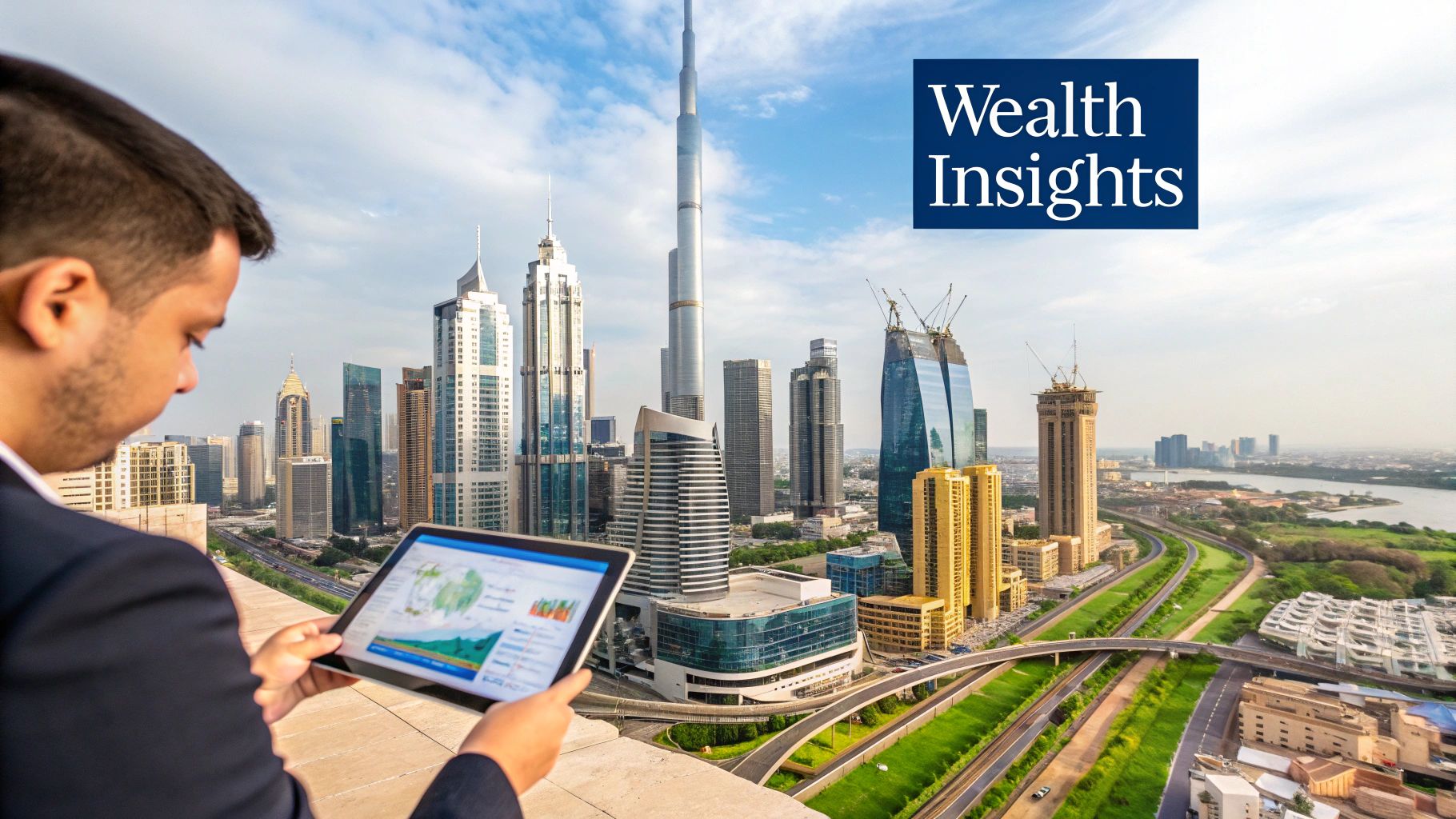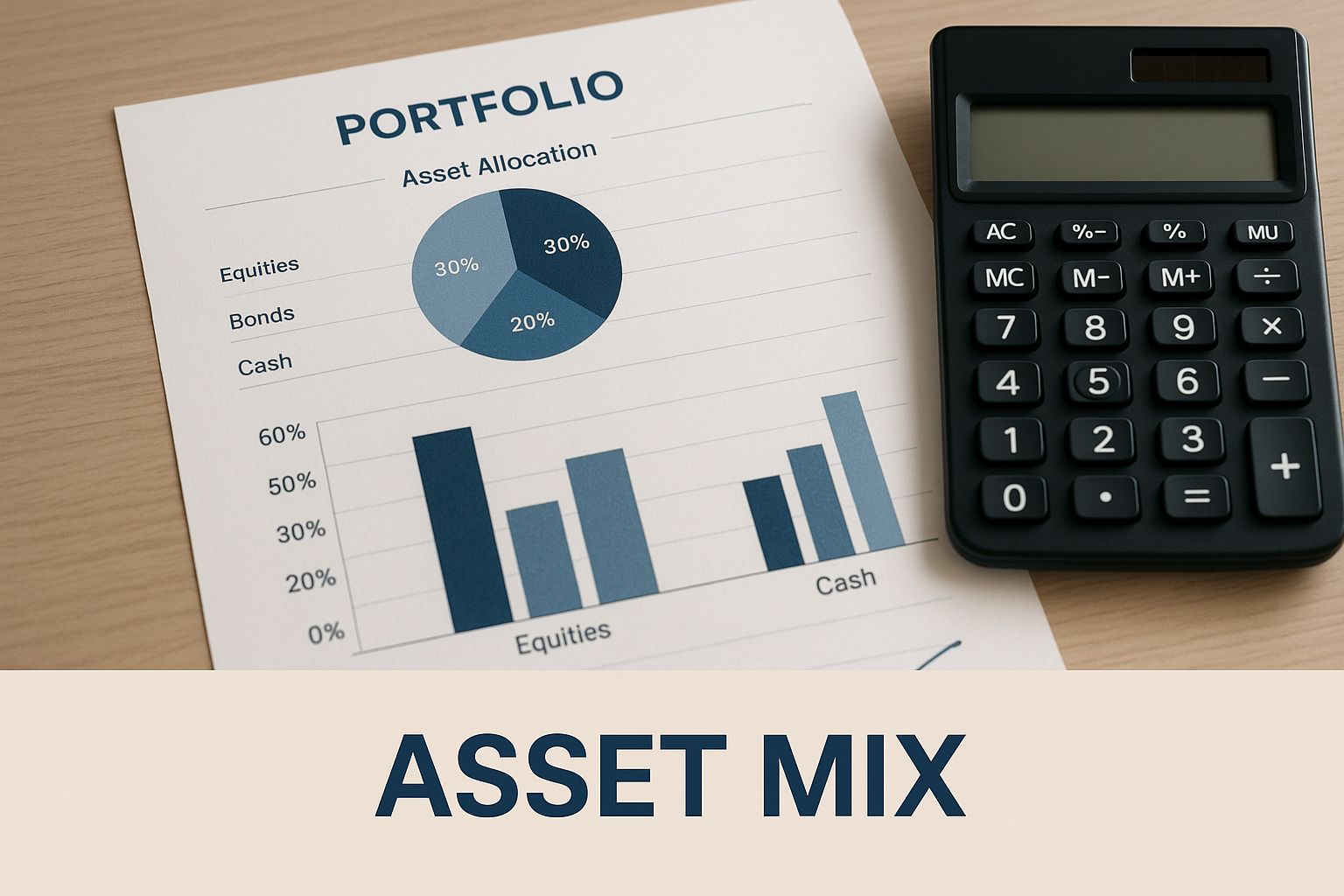Expert Wealth Management in Dubai | Achieve Financial Success
- GTAG WRITER

- May 13, 2025
- 10 min read
Dubai's Emergence as a Global Wealth Management Powerhouse

Dubai has quickly transitioned from a regional trading center into a significant global wealth management hub. This impressive growth is driven by a combination of factors, including its strategic location, a business-friendly environment, and a strong regulatory framework. These features attract high-net-worth individuals and businesses looking for effective financial solutions. This shift in the financial world offers interesting opportunities for both investors and wealth managers.
Key Drivers of Dubai's Financial Growth
Dubai's rise as a wealth management powerhouse isn't accidental. It's the result of carefully planned policies and investments aimed at attracting global capital. The zero income tax policy, for instance, is a major incentive for international investors.
The ease of doing business in Dubai, combined with its political stability, creates a secure and predictable environment for investment. This stability encourages long-term financial planning and investment strategies.
Furthermore, the Dubai government has actively supported the development of a top-tier financial infrastructure. Initiatives like the Dubai International Financial Centre (DIFC) offer a specialized regulatory environment, attracting leading financial institutions. This creates a concentrated hub of expertise and resources, making Dubai even more appealing for wealth management. For more information on financial statistics, see this helpful resource: AI in Wealth Management.
The Expanding Wealth Management Ecosystem
Wealth management in Dubai has seen significant growth, fueled by the city's status as a global financial center. By 2025, Dubai's economy is thriving, with increased demand for real estate, a substantial influx of wealthy individuals, and a surge in infrastructure spending. This growth is attributed to initiatives like the Dubai Financial Market and Abu Dhabi Securities Exchange, which have adopted advanced trading platforms, expanded investment options, and attracted regional and global participants. As a result, independent wealth managers have found a thriving environment, with many setting up operations in Dubai to capitalize on the region's wealth transition. You can learn more about this wealth transition here: Transition of Wealth.
This growth is also evident in the increasing number of family offices establishing themselves in Dubai. Family offices provide customized wealth management services to affluent families, strengthening Dubai's position as a preferred destination for private wealth. This has led to a highly competitive market, encouraging wealth managers to innovate and provide increasingly sophisticated services. You can explore additional resources on our website: Our Blog Posts Sitemap. Dubai's dedication to innovation and future-focused policies solidifies its role as a major player in the global wealth management arena.
Navigating the UAE's Investor-Friendly Regulatory Landscape

This infographic illustrates a typical asset mix for wealth management in Dubai. It shows how a diversified portfolio might balance various asset classes, like equities, bonds, and real estate. This visual emphasizes the importance of strategic asset allocation in achieving financial goals and managing risk.
Dubai's allure goes beyond its stunning architecture. Its regulatory environment offers a key advantage, designed to both attract and protect wealth. This framework helps investors maximize returns while minimizing potential risks.
The UAE's tax-efficient policies and robust asset protection structures, for instance, create a haven for both local and international investors. This encourages long-term financial planning and wealth preservation strategies.
Key Regulatory Advantages in Dubai
Several regulatory factors contribute to Dubai's appeal for investors.
0% personal and corporate income tax: This significantly boosts investment returns compared to higher-tax jurisdictions.
Financial Free Zones: These zones offer distinct advantages, including 100% foreign ownership and exemption from certain regulations. This fosters innovation and attracts international businesses, particularly in sectors like FinTech.
Strong regulatory oversight: Dubai's robust regulatory bodies prioritize transparency and investor protection, building confidence in the financial market and providing peace of mind for individuals and institutions.
These factors, combined with political stability and attractive residency programs, make Dubai particularly appealing to Ultra-High-Net-Worth Individuals (UHNWIs). This has fueled growth in independent asset managers and multi-family offices. The Islamic finance market is projected to exceed $3 trillion by 2025, creating significant opportunities for wealth managers. Advancements in automation, data analytics, and cloud-based platforms like Salesforce are also transforming investment management, enabling real-time portfolio optimization and enhanced investor engagement. Learn more about the increasing importance of independent wealth management in Dubai.
Comparing Dubai with Other Global Financial Centers
Dubai's regulatory framework is increasingly competitive with established global financial centers. While each center has its unique strengths, Dubai offers distinct advantages. See our sitemap for more information. This competitive landscape provides investors with a range of options to suit their needs and goals. Dubai's focus on long-term stability and sustainable growth positions it as a strong contender in global wealth management.
The following table highlights some key regulatory benefits of the UAE compared to other major financial centers.
UAE Wealth Management Regulatory Benefits
Comparison of key regulatory advantages in Dubai versus other global financial centers
Regulatory Feature | Dubai/UAE | Singapore | Hong Kong | London |
|---|---|---|---|---|
Personal Income Tax | 0% | Progressive, up to 22% | Progressive, up to 17% | Progressive, up to 45% |
Corporate Income Tax | 9% (with exemptions) | 17% | 16.5% | 25% |
Financial Free Zones | Yes, with various benefits | Yes, but with specific regulations | Yes, but with limitations | No dedicated free zones in the same way |
Capital Gains Tax | 0% | Varies depending on asset | Varies depending on asset | Up to 28% |
Regulatory Oversight | Strong, focused on investor protection | Strong, with established regulations | Robust, but evolving | Established and comprehensive |
This table summarizes key regulatory differences, emphasizing Dubai's competitive advantages in areas like personal and corporate income tax. While other centers have their own strengths, Dubai’s approach creates a particularly attractive environment for investors seeking tax efficiency and asset protection.
High-Potential Investment Opportunities in Dubai's Market

Dubai's regulatory landscape is a major draw for investors. But where are the most promising opportunities? This section explores Dubai's dynamic investment scene, highlighting both emerging sectors and established asset classes.
Emerging Sectors and High-Growth Potential
Dubai's economy isn't just about traditional industries. Emerging sectors are showing strong growth potential. The technology sector, especially FinTech, is expanding rapidly, driven by government support and a vibrant startup community.
Renewable energy is also gaining traction. Dubai's significant investments in sustainable development create exciting prospects for investors focused on a greener future. These emerging sectors offer a compelling alternative to traditional investments.
Established Asset Classes and Consistent Returns
Alongside high-growth sectors, established asset classes continue to deliver. Dubai's real estate market remains a popular investment, offering attractive returns and long-term growth potential.
Dubai's strategic location makes it a global hub for trade and logistics. Investing in related infrastructure and businesses can generate consistent returns and fuel regional economic expansion.
Dubai: A Rising Wealth Management Hub
Dubai's focus on financial markets, healthcare, and education strengthens its position as a wealth management center. The Dubai International Financial Centre (DIFC) plays a key role, hosting events like the Dubai AI & Web3 Festival, connecting global leaders in AI and FinTech. This blend of financial infrastructure and technological innovation positions Dubai as a competitor to established financial centers.
The wealth management industry in Dubai is also experiencing consolidation, with smaller firms facing market pressures. Learn more: Redefining Global Wealth and Investments in the Middle East.
Building a Diversified Portfolio in Dubai
Balancing high-growth potential with wealth preservation is essential for investors in Dubai. Diversification is a key strategy. Investors might allocate a portion of their portfolio to emerging sectors like technology, while maintaining a stake in established areas like real estate. This approach helps manage risk while capitalizing on Dubai's unique investment environment.
For more detailed analysis and investment strategies, explore: Our Blog Categories Sitemap. Building a well-diversified portfolio is vital for long-term financial success in Dubai's vibrant market. Understanding various entry points and assessing risk tolerance are crucial for achieving financial goals.
Selecting Your Ideal Wealth Management Partner in Dubai
Dubai’s wealth management sector is flourishing, presenting a diverse array of firms eager to manage your finances. With so many choices, finding the right partner for your financial future can feel overwhelming. This section offers a practical guide to evaluating wealth management firms in Dubai, helping you identify a partner aligned with your goals.
Understanding Your Needs and Goals
Before evaluating potential wealth managers, it’s crucial to understand your financial situation, goals, and risk tolerance. Are you focused on preserving wealth, pursuing aggressive growth, or seeking a balanced approach? What are your short-term and long-term financial objectives? Clearly defining these factors will help you find a firm whose expertise and investment philosophy match your needs. Understanding pre-IPO investment risks is also important. Explore this resource for more information: India Pre IPO Access Risks Rewards.
Evaluating Wealth Management Firms
Once you have a clear picture of your financial landscape, you can start assessing potential partners. Consider these key factors:
Credentials and Expertise: Seek firms with established track records and advisors holding relevant certifications like Certified Financial Planner (CFP) or Chartered Financial Analyst (CFA).
Fee Structure: Transparency is paramount. Understand all fees upfront, including management fees, performance fees, and other expenses.
Communication and Reporting: Your wealth manager should provide regular, clear reports on your portfolio’s performance and be available to answer your questions.
Cultural Fit: A strong, trusting relationship with your advisor is essential. Consider the firm’s culture and ensure it aligns with your values.
Client Testimonials and Reviews: Online reviews and testimonials offer valuable insights into other clients’ experiences.
Due Diligence and Red Flags
Thorough due diligence is critical. Be wary of firms that:
Promise unrealistic returns: If it seems too good to be true, it probably is.
Lack transparency in fees: Hidden fees can significantly impact your returns.
Pressure you into quick decisions: A reputable advisor will give you time to consider your options.
Have a history of regulatory violations: Check the firm’s regulatory history.
Choosing the Right Type of Wealth Management Provider
Dubai offers a variety of wealth management providers, each catering to specific needs. The following table provides a comparison to help you choose the right fit.
To help you navigate the different options available in Dubai's wealth management landscape, we've compiled the following comparison table:
Dubai Wealth Management Service Providers Comparison: Overview of different types of wealth management providers in Dubai with their strengths and considerations
Provider Type | Typical Services | Strengths | Considerations | Ideal For |
|---|---|---|---|---|
Private Banks | Comprehensive wealth management, lending, banking services | Global reach, extensive resources | Higher fees, potentially less personalized service | Ultra-high-net-worth individuals |
Independent Wealth Managers | Personalized financial planning, investment management | Client-centric approach, flexible solutions | May have fewer resources than larger institutions | High-net-worth individuals seeking tailored services |
Family Offices | Holistic wealth management for affluent families | Integrated services, wealth preservation focus | Typically require significant assets under management | Ultra-high-net-worth families |
Robo-Advisors | Automated investment management, low fees | Accessibility, cost-effective | Limited human interaction, less customization | Tech-savvy investors with smaller portfolios |
As shown in the table, each provider type has its own set of advantages and disadvantages. Choosing the right type depends largely on your individual circumstances and preferences.
Finding the right wealth management partner is a crucial decision. Learn more about our team and how we can help: Our Team. By understanding your needs, conducting thorough due diligence, and asking the right questions, you can choose a firm that will help you achieve your financial aspirations in Dubai’s dynamic market.
Islamic Finance: Modern Approaches to Sharia-Compliant Investing
Islamic finance has evolved from a niche market into a prominent wealth management strategy, appealing to a diverse range of investors. This section explores Sharia-compliant investing within Dubai's financial market, highlighting how financial products can yield strong returns while adhering to Islamic principles. You might be interested in: Our Blog Posts Sitemap.
Understanding Sharia-Compliant Investing
Sharia-compliant investing adheres to specific guidelines derived from Islamic law. These principles prohibit investments in businesses involved in alcohol, gambling, or pork. Riba, or interest, is also forbidden. Instead, Sharia-compliant investments prioritize profit-sharing and asset-backed financing.
Modern Islamic Financial Instruments
The Islamic finance sector has developed innovative financial instruments aligned with Sharia principles. Sukuk, for instance, are Islamic bonds representing ownership in an underlying asset. These provide returns linked to the asset's performance, not interest payments. Other instruments include Murabaha (cost-plus financing) and Mudarabah (profit-sharing partnerships), offering alternatives to conventional loans and investments.
Performance and Comparison With Conventional Approaches
How do Sharia-compliant investments compare to conventional approaches? Studies suggest Islamic funds can achieve competitive returns. While performance varies depending on market conditions and specific investments, many Islamic funds have shown resilience during market downturns. This stability can be attributed to the focus on tangible assets and ethical investing principles.
Incorporating Islamic Finance Into a Diversified Portfolio
Dubai investors can effectively integrate Islamic financial products into their portfolios. This can involve allocating investments to Sukuk, participating in Sharia-compliant mutual funds, or exploring other Islamic investment vehicles. This strategy helps investors align financial goals with their values while achieving diversification.
Certification and Compliance
Ensuring investment compliance with Sharia law involves a certification process. Sharia boards, composed of Islamic scholars, review financial products and services to confirm adherence to religious principles. This oversight assures investors that their investments are truly Sharia-compliant.
The Growing Islamic Finance Sector in Dubai
Dubai is a leading hub for Islamic finance, offering diverse Sharia-compliant products and services. This sector continues to expand, presenting increasingly varied opportunities for investors. As wealth management in Dubai grows, Islamic finance plays a vital role in the region's financial landscape.
Technology Transforming Wealth Management in Dubai
Dubai's wealth management sector is buzzing with technological advancements, creating exciting new possibilities for investors. These changes are reshaping how portfolios are managed and how clients connect with their advisors.
AI-Powered Analytics and Investment Opportunities
Artificial intelligence (AI) is becoming increasingly influential in wealth management. AI-driven analytics can sift through enormous datasets to uncover hidden investment opportunities and evaluate risk more effectively than traditional methods. This empowers wealth managers to make more informed decisions and potentially generate higher returns for their clients.
For example, AI algorithms can analyze market trends, economic indicators, and company performance to anticipate asset price fluctuations and fine-tune portfolio allocation.
Blockchain Technology and Asset Security
Blockchain, the technology behind cryptocurrencies, is also revolutionizing asset ownership and security. Its decentralized and encrypted nature offers greater transparency and minimizes the risk of fraud.
This translates to more secure and efficient transaction processing, potentially lowering costs and strengthening trust between clients and wealth managers. This is particularly relevant in Dubai, given its ambition to become a leading global hub for FinTech and blockchain innovation.
Digital Platforms and Democratization of Wealth Solutions
Digital platforms are democratizing access to sophisticated wealth management tools. Previously, these tools were primarily reserved for ultra-high-net-worth individuals. Now, a broader range of investors can access advanced portfolio management, financial planning tools, and personalized advice through these online platforms.
This wider access to sophisticated wealth management solutions is changing how individuals manage their finances in Dubai and beyond.
Separating Hype from Reality
While the potential advantages of technology in wealth management are significant, it's crucial to separate genuine value from marketing hype. Not every new technology offers a real benefit. Investors should carefully evaluate the practical applications of new technologies and prioritize solutions that address their individual needs and goals.
For instance, while robo-advisors might suit some, others may still prefer the personalized guidance of a traditional wealth manager supported by technology.
Dubai's Strategic Initiatives in FinTech
Dubai's government is actively championing technological innovation within the financial sector. Initiatives like the Dubai International Financial Centre (DIFC) and various regulatory sandboxes encourage FinTech companies to develop and test new solutions in a controlled environment. This supportive ecosystem helps position Dubai at the forefront of wealth management innovation.
These initiatives foster technological advancements in wealth management, attracting global talent and investment. This ultimately benefits investors by providing access to a broader array of innovative and secure financial solutions.
Are you ready to experience the advantages of advanced wealth management solutions in Dubai? Contact Gulf Tax Accounting Group (GTAG) today at https://www.gtag.ae. We provide comprehensive financial services tailored to your specific needs, utilizing the latest technologies to help you achieve your financial goals. Let us help you navigate the complexities of wealth management in Dubai’s dynamic market.
Article created using [Outrank](https://outrank.so)




Having worked in the financial sector for over a decade, I’ve seen how true wealth is built—not just through smart investments, but through strategic guidance and the right tools. That’s why I’ve come to appreciate the unique combination of expert wealth management in places like Dubai, where high-net-worth individuals receive tailored financial planning, alongside cutting-edge platforms like here Seekapa that are redefining how we trade. Seekapa’s AI-driven interface makes global investing incredibly intuitive, even for those just starting out. The automation, speed, and seamless access it offers is a game changer—especially when paired with the disciplined, long-term strategies provided by experienced advisors. In today’s fast-paced markets, having both smart human insight and advanced technology is no longer optional—it’s essential.